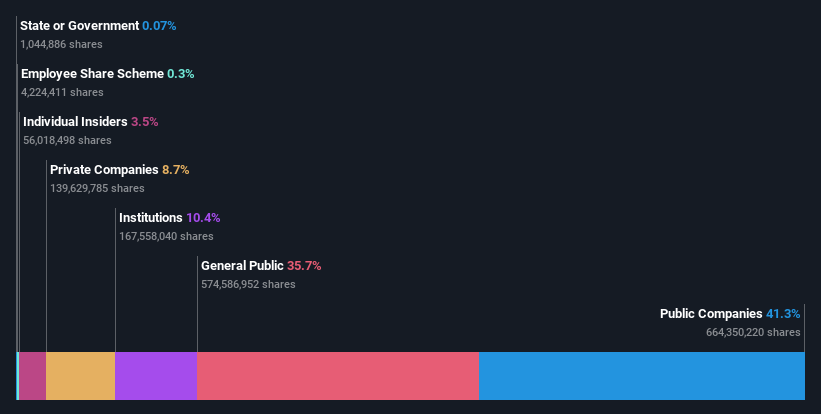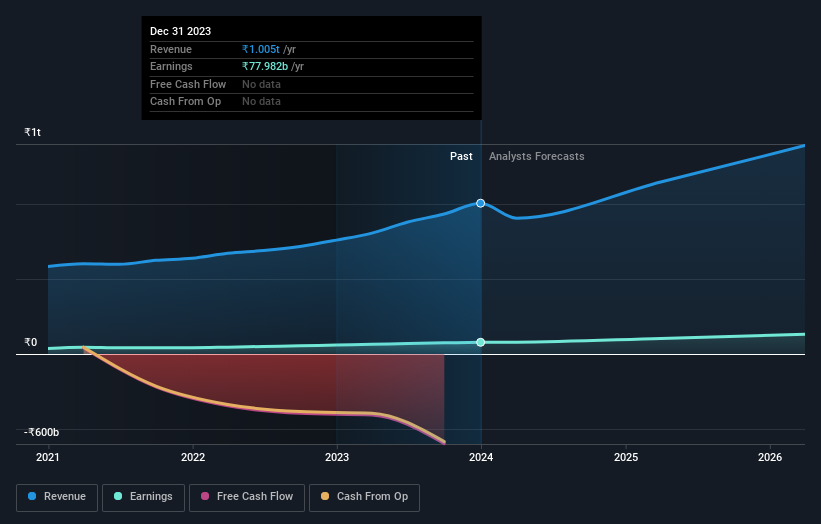- India
- /
- Diversified Financial
- /
- NSEI:BAJAJFINSV
Bajaj Finserv Ltd.'s (NSE:BAJAJFINSV) top owners are public companies with 41% stake, while 36% is held by individual investors

Key Insights
- Significant control over Bajaj Finserv by public companies implies that the general public has more power to influence management and governance-related decisions
- A total of 5 investors have a majority stake in the company with 50% ownership
- Recent sales by insiders
A look at the shareholders of Bajaj Finserv Ltd. (NSE:BAJAJFINSV) can tell us which group is most powerful. We can see that public companies own the lion's share in the company with 41% ownership. In other words, the group stands to gain the most (or lose the most) from their investment into the company.
And individual investors on the other hand have a 36% ownership in the company.
In the chart below, we zoom in on the different ownership groups of Bajaj Finserv.
Check out our latest analysis for Bajaj Finserv

What Does The Institutional Ownership Tell Us About Bajaj Finserv?
Institutional investors commonly compare their own returns to the returns of a commonly followed index. So they generally do consider buying larger companies that are included in the relevant benchmark index.
As you can see, institutional investors have a fair amount of stake in Bajaj Finserv. This implies the analysts working for those institutions have looked at the stock and they like it. But just like anyone else, they could be wrong. If multiple institutions change their view on a stock at the same time, you could see the share price drop fast. It's therefore worth looking at Bajaj Finserv's earnings history below. Of course, the future is what really matters.

Hedge funds don't have many shares in Bajaj Finserv. The company's largest shareholder is Bajaj Holdings & Investment Limited, with ownership of 41%. For context, the second largest shareholder holds about 3.8% of the shares outstanding, followed by an ownership of 2.3% by the third-largest shareholder.
Our research also brought to light the fact that roughly 50% of the company is controlled by the top 5 shareholders suggesting that these owners wield significant influence on the business.
While it makes sense to study institutional ownership data for a company, it also makes sense to study analyst sentiments to know which way the wind is blowing. There are a reasonable number of analysts covering the stock, so it might be useful to find out their aggregate view on the future.
Insider Ownership Of Bajaj Finserv
While the precise definition of an insider can be subjective, almost everyone considers board members to be insiders. Company management run the business, but the CEO will answer to the board, even if he or she is a member of it.
Insider ownership is positive when it signals leadership are thinking like the true owners of the company. However, high insider ownership can also give immense power to a small group within the company. This can be negative in some circumstances.
We can report that insiders do own shares in Bajaj Finserv Ltd.. The insiders have a meaningful stake worth ₹88b. Most would say this shows a good alignment of interests between shareholders and the board. Still, it might be worth checking if those insiders have been selling.
General Public Ownership
With a 36% ownership, the general public, mostly comprising of individual investors, have some degree of sway over Bajaj Finserv. While this size of ownership may not be enough to sway a policy decision in their favour, they can still make a collective impact on company policies.
Private Company Ownership
Our data indicates that Private Companies hold 8.7%, of the company's shares. It's hard to draw any conclusions from this fact alone, so its worth looking into who owns those private companies. Sometimes insiders or other related parties have an interest in shares in a public company through a separate private company.
Public Company Ownership
It appears to us that public companies own 41% of Bajaj Finserv. We can't be certain but it is quite possible this is a strategic stake. The businesses may be similar, or work together.
Next Steps:
It's always worth thinking about the different groups who own shares in a company. But to understand Bajaj Finserv better, we need to consider many other factors. For instance, we've identified 2 warning signs for Bajaj Finserv (1 doesn't sit too well with us) that you should be aware of.
If you would prefer discover what analysts are predicting in terms of future growth, do not miss this free report on analyst forecasts.
NB: Figures in this article are calculated using data from the last twelve months, which refer to the 12-month period ending on the last date of the month the financial statement is dated. This may not be consistent with full year annual report figures.
Valuation is complex, but we're here to simplify it.
Discover if Bajaj Finserv might be undervalued or overvalued with our detailed analysis, featuring fair value estimates, potential risks, dividends, insider trades, and its financial condition.
Access Free AnalysisHave feedback on this article? Concerned about the content? Get in touch with us directly. Alternatively, email editorial-team (at) simplywallst.com.
This article by Simply Wall St is general in nature. We provide commentary based on historical data and analyst forecasts only using an unbiased methodology and our articles are not intended to be financial advice. It does not constitute a recommendation to buy or sell any stock, and does not take account of your objectives, or your financial situation. We aim to bring you long-term focused analysis driven by fundamental data. Note that our analysis may not factor in the latest price-sensitive company announcements or qualitative material. Simply Wall St has no position in any stocks mentioned.
About NSEI:BAJAJFINSV
Bajaj Finserv
Through its subsidiaries, engages in the provision of financial services in India.
Moderate growth potential very low.
Market Insights
Community Narratives


